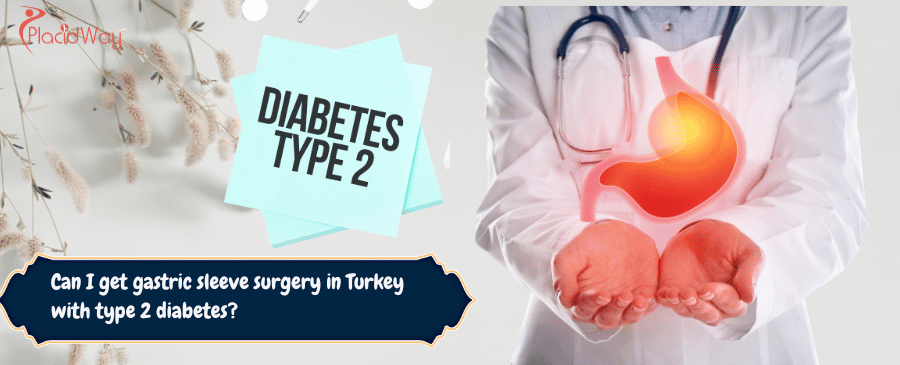Gastric Sleeve in Turkey: Diabetes Solution

Living with Type 2 Diabetes often involves managing blood sugar levels, medication, and lifestyle changes. For many individuals, conventional weight loss methods alone may not be enough to achieve significant and lasting improvements. This is where gastric sleeve surgery in Turkey comes into play, offering a powerful tool for weight loss and, importantly, for the management and potential remission of Type 2 Diabetes. Turkey has emerged as a leading destination for bariatric surgery, including the gastric sleeve, due to its high-quality medical facilities, experienced surgeons, and comparatively affordable costs. This blog will address common questions about getting gastric sleeve surgery in Turkey if you have Type 2 Diabetes, providing detailed answers to help you make an informed decision.
Can individuals with Type 2 Diabetes undergo gastric sleeve surgery in Turkey?
Gastric sleeve surgery is frequently recommended for patients with Type 2 Diabetes, especially when combined with obesity. The procedure, also known as sleeve gastrectomy, involves removing a large portion of the stomach, leaving a smaller, banana-shaped pouch. This not only restricts food intake but also has profound metabolic effects, influencing hunger hormones and improving insulin sensitivity. Many patients experience rapid improvements in their blood sugar levels, often before significant weight loss even occurs.
Turkish clinics specializing in bariatric surgery are well-versed in managing patients with co-existing conditions like Type 2 Diabetes. They conduct thorough evaluations to ensure patient safety and optimize outcomes, working with a multidisciplinary team that often includes endocrinologists, dietitians, and bariatric surgeons.
What are the benefits of gastric sleeve surgery for Type 2 Diabetes?
Gastric sleeve surgery offers a multitude of benefits for individuals with Type 2 Diabetes. One of the most significant advantages is the high rate of diabetes remission. Studies show that a substantial percentage of patients, often between 60-80%, experience complete remission of Type 2 Diabetes after the surgery, meaning they no longer require medication to maintain normal blood sugar levels. Even for those who don't achieve full remission, there's often a considerable reduction in medication dosage and improved glycemic control.
Beyond diabetes-specific benefits, the surgery leads to significant and sustained weight loss, which in turn improves other obesity-related health conditions such as high blood pressure, high cholesterol, and sleep apnea. The hormonal changes induced by the surgery, particularly the reduction of ghrelin (the hunger hormone), contribute to decreased appetite and increased feelings of fullness, making it easier to adhere to dietary changes.
What are the eligibility criteria for gastric sleeve surgery in Turkey with Type 2 Diabetes?
While specific criteria can vary slightly between clinics, the general guidelines for gastric sleeve surgery in Turkey for patients with Type 2 Diabetes typically include:
- BMI of 35 or higher: This is the most common criterion for individuals with obesity-related health conditions.
- BMI of 40 or higher: For those without significant co-morbidities.
- Presence of Type 2 Diabetes: The surgery is particularly beneficial for managing uncontrolled or difficult-to-manage Type 2 Diabetes.
- Failure of Non-Surgical Weight Loss: Patients should have a history of trying other weight loss methods like diet and exercise without achieving sustainable results.
- Commitment to Lifestyle Changes: Successful outcomes depend on the patient's willingness to adopt long-term dietary and exercise habits.
- Overall Good Health: Patients must be in a suitable medical condition to undergo general anesthesia and surgery.
- Psychological Readiness: A psychological evaluation is often conducted to ensure the patient is mentally prepared for the significant lifestyle changes post-surgery.
How does gastric sleeve surgery improve Type 2 Diabetes?
The mechanism behind the improvement of Type 2 Diabetes after gastric sleeve surgery is multi-faceted. Firstly, the reduced stomach size limits the amount of food a person can consume, leading to significant weight loss. This weight loss directly improves insulin sensitivity, as excess fat often contributes to insulin resistance.
Secondly, and perhaps more profoundly, the surgery causes favorable changes in gut hormones. By removing the part of the stomach that produces ghrelin, the hunger hormone, appetite is significantly reduced. Moreover, the faster passage of food to the small intestine stimulates the release of other hormones, such as GLP-1 (Glucagon-Like Peptide-1), which play a crucial role in regulating blood sugar and promoting insulin secretion. These hormonal shifts often lead to improved blood sugar control very soon after surgery, sometimes even before substantial weight loss occurs.
What is the success rate of gastric sleeve surgery for Type 2 Diabetes in Turkey?
Turkey has become a hub for medical tourism, and its bariatric surgery programs boast high success rates, particularly for conditions like Type 2 Diabetes. Many reputable hospitals and clinics in Turkey report impressive outcomes, with a large percentage of patients experiencing complete or partial remission of their diabetes. This means a significant reduction in or complete elimination of diabetes medications. The success is attributed to the expertise of Turkish surgeons, the advanced medical infrastructure, and the comprehensive pre- and post-operative care provided, which often includes ongoing nutritional guidance and follow-up.
What are the potential risks of gastric sleeve surgery for Type 2 Diabetes patients?
Like any surgical procedure, gastric sleeve surgery carries potential risks, which might be slightly elevated in patients with Type 2 Diabetes due to their underlying health status. These risks include:
- Infection: At the surgical site or internally.
- Bleeding: Both during and after the surgery.
- Staple Line Leaks: A rare but serious complication where stomach contents leak from the resected stomach.
- Complications from Anesthesia: Such as adverse reactions or respiratory issues.
- Blood Clots: In the legs or lungs.
- Nutritional Deficiencies: Due to reduced food intake and absorption, requiring lifelong vitamin and mineral supplementation.
- Dumping Syndrome: Though less common with sleeve gastrectomy than with gastric bypass, it can occur if food moves too quickly through the digestive system, causing symptoms like nausea, diarrhea, and dizziness.
However, modern surgical techniques, particularly laparoscopic approaches, and rigorous patient screening help minimize these risks. Turkish clinics often have experienced teams and state-of-the-art facilities to manage potential complications effectively.
How long is the recovery period after gastric sleeve surgery in Turkey?
The recovery timeline for gastric sleeve surgery can vary for each individual, but generally follows a predictable pattern. Patients usually stay in the hospital for 2 to 3 days for monitoring after the procedure. During this time, they gradually transition from clear liquids to full liquids. Most patients can return to light daily activities, such as walking, within a week or two. Strenuous activities and heavy lifting are usually restricted for 6 to 8 weeks.
Full recovery and adaptation to the new dietary and lifestyle changes can take several months. This period is crucial for establishing healthy habits and ensuring long-term success. Post-operative care often includes regular follow-up appointments with the surgical team and a dietitian to monitor progress and address any concerns.
What is the typical cost of gastric sleeve surgery in Turkey for Type 2 Diabetes patients?
One of the significant draws of seeking gastric sleeve surgery in Turkey, particularly for patients managing Type 2 Diabetes, is the cost-effectiveness. While prices can vary based on the hospital's reputation, the surgeon's experience, the comprehensiveness of the package (e.g., including accommodation, transfers, and post-operative care), and any additional medical needs, the cost is often considerably lower than in countries like the US, UK, or Canada. This affordability does not typically compromise the quality of care, as many Turkish facilities adhere to international standards and utilize advanced technology.
What kind of dietary changes are required after gastric sleeve surgery for Type 2 Diabetes?
Post-gastric sleeve surgery dietary changes are fundamental to both weight loss and the management of Type 2 Diabetes. The diet progresses in stages to allow the stomach to heal and adapt:
- Clear Liquids: Immediately after surgery (1-2 days).
- Full Liquids: For several weeks, including protein shakes, thin soups, and sugar-free drinks.
- Pureed Foods: Introducing soft, blended foods rich in protein.
- Soft Foods: Gradually adding easily digestible solid foods.
- Regular Foods: Small, frequent, protein-rich meals, focusing on lean proteins, non-starchy vegetables, and healthy fats.
For Type 2 Diabetes patients, strict avoidance of sugary foods and drinks is crucial to prevent "dumping syndrome" and to maintain stable blood sugar levels. Emphasis is placed on adequate protein intake to preserve muscle mass, and lifelong vitamin and mineral supplementation is essential to prevent deficiencies. A dietitian will provide detailed guidance throughout this process.
Will gastric sleeve surgery eliminate the need for diabetes medication?
While it's not guaranteed for every patient, a primary goal and common outcome of gastric sleeve surgery for Type 2 Diabetes is the reduction or elimination of diabetes medications. The rapid improvement in blood sugar control, often occurring within days or weeks of surgery, frequently allows patients to significantly decrease their insulin doses or stop oral medications entirely. The degree of reduction or remission depends on factors such as the duration of diabetes, the severity of the condition, and the patient's adherence to post-operative lifestyle changes. Regular monitoring with an endocrinologist is essential to adjust medications as needed.
What post-operative follow-up care is provided in Turkey for international patients with Type 2 Diabetes?
Reputable bariatric centers in Turkey understand the unique needs of international patients. Post-operative care typically involves a structured follow-up plan that may include:
- Hospital Stay: As mentioned, 2-3 days for initial recovery and monitoring.
- Dietitian Support: Ongoing virtual or in-person consultations to guide dietary progression and ensure nutritional adequacy.
- Medical Consultations: Remote check-ups with the surgical team to monitor recovery, weight loss, and diabetes management.
- Support Groups: Some clinics offer access to online support groups for patients.
- Emergency Contact: Providing a point of contact for urgent concerns.
Patients are usually advised to maintain close contact with their primary care physician and endocrinologist in their home country for ongoing medical management, especially concerning their Type 2 Diabetes. Turkish clinics often provide detailed medical reports to facilitate this.
Is gastric sleeve surgery a permanent solution for Type 2 Diabetes?
Gastric sleeve surgery can be a highly effective and long-lasting intervention for Type 2 Diabetes. For many, it provides a "permanent solution" in terms of achieving and maintaining diabetes remission. However, it's crucial to understand that the surgery is a powerful tool that facilitates weight loss and metabolic improvements; it is not a "cure-all" without patient effort. Long-term success in managing Type 2 Diabetes and weight after surgery depends heavily on the patient's adherence to the recommended diet, regular exercise, and lifelong vitamin supplementation. Without these sustained lifestyle changes, there is a risk of weight regain and, consequently, a potential return or worsening of diabetes.
Can gastric sleeve surgery prevent future diabetes complications?
One of the most profound benefits of gastric sleeve surgery for Type 2 Diabetes patients is its potential to prevent or mitigate the long-term complications associated with poorly controlled blood sugar. Chronic high blood sugar can damage various organs and systems in the body. By achieving better glycemic control, the surgery can help reduce the risk of:
- Cardiovascular Disease: Heart attacks, strokes, and high blood pressure.
- Kidney Disease: Including kidney failure.
- Neuropathy: Nerve damage that can affect various parts of the body.
- Retinopathy: Eye damage leading to vision problems or blindness.
- Foot Problems: Due to nerve damage and poor circulation.
The significant weight loss also reduces inflammation and stress on the body, further contributing to overall health improvement and complication prevention.
For those considering gastric sleeve surgery in Turkey for Type 2 Diabetes, PlacidWay can help you connect with top-tier clinics and experienced surgeons who specialize in bariatric and metabolic procedures. Explore PlacidWay for comprehensive solutions to your healthcare needs and to find the right path to a healthier future.


.png)






.png)
.png)






Share this listing